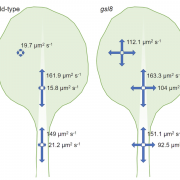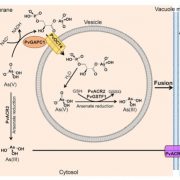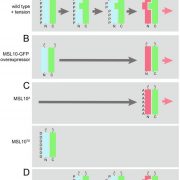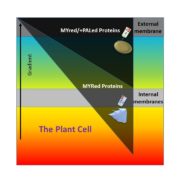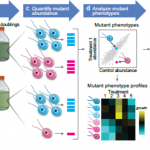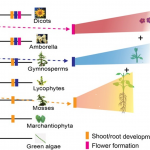NPA directly binds to and inhibits PIN transporters (PNAS)
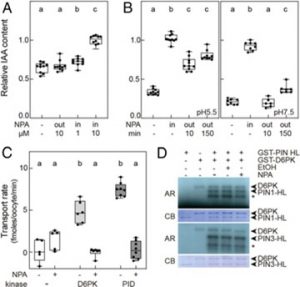 N-1-naphthylphthalamic acid (NPA) inhibits polar auxin transport (PAT). Though used for over six decades, the precise mechanism by which it inhibits PAT is still unclear. A new study by Abas and colleagues now suggests that NPA directly associates with and inhibits the activity of PIN-FORMED (PIN) transporters. The authors used oocytes from Xenopus laevis as a heterologous system to express PIN transporters, which allows direct injection of drugs into the cells. Using this system, low concentrations of NPA were showed to specifically inhibit efflux of radiolabelled indole-3-acetic acid (3H-IAA) through active canonical and non-canonical PIN proteins. To probe the possible mechanism of NPA-PIN interaction, the authors performed a microscale binding assay that suggested direct, high-affinity binding of NPA with membrane fractions enriched with PIN proteins, independent of phosphorylation status and interference from other proteins. Further, examining effects of NPA on interaction between the PINs, it was found to interfere with dimerization of PIN proteins. Together, these results provide the first mechanistic details into direct inhibition of PIN proteins by NPA. (Summary by Pavithran Narayanan @pavi_narayanan) Proc. Natl. Acad. Sci. USA 10.1073/pnas.2020857118
N-1-naphthylphthalamic acid (NPA) inhibits polar auxin transport (PAT). Though used for over six decades, the precise mechanism by which it inhibits PAT is still unclear. A new study by Abas and colleagues now suggests that NPA directly associates with and inhibits the activity of PIN-FORMED (PIN) transporters. The authors used oocytes from Xenopus laevis as a heterologous system to express PIN transporters, which allows direct injection of drugs into the cells. Using this system, low concentrations of NPA were showed to specifically inhibit efflux of radiolabelled indole-3-acetic acid (3H-IAA) through active canonical and non-canonical PIN proteins. To probe the possible mechanism of NPA-PIN interaction, the authors performed a microscale binding assay that suggested direct, high-affinity binding of NPA with membrane fractions enriched with PIN proteins, independent of phosphorylation status and interference from other proteins. Further, examining effects of NPA on interaction between the PINs, it was found to interfere with dimerization of PIN proteins. Together, these results provide the first mechanistic details into direct inhibition of PIN proteins by NPA. (Summary by Pavithran Narayanan @pavi_narayanan) Proc. Natl. Acad. Sci. USA 10.1073/pnas.2020857118


